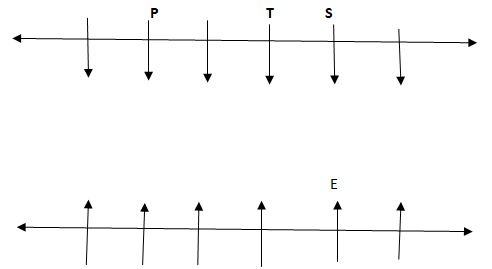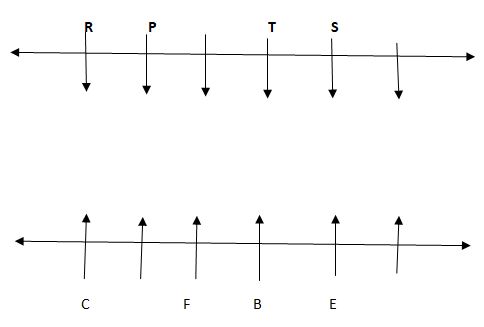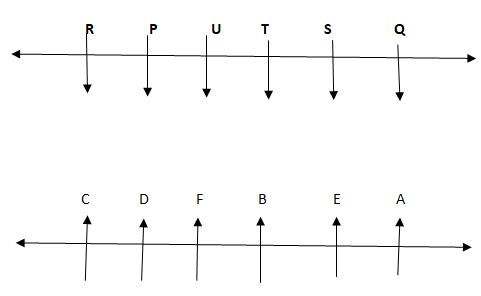Question
R is related to D in the same way as U is related to B
based on the given arrangement. Which of the following is S related to, following the same pattern? Directions (28 – 32): Answer the questions on the basis of the information given below. Twelve persons are sitting in two parallel rows containing six people along each of the rows. P,Q,R,S,T,U are facing south direction and are seated in row1 and A,B,C,D,E,F are facing the North direction and are seated in row2. Therefore, in the given seating arrangement, each member seated in a row faces another member of the other row. The person C is not sitting next to E. P, sits at the third position to the right of S. F, is not sitting directly opposite S. E is sitting directly opposite S. F, is not sitting at any of the end of the rows. Exactly two persons are sitting between R and T. A is not sitting next to C. T is not sitting directly opposite F. R is sitting at one of the ends of the rows. Exactly two persons are sitting between C and B. F is not sitting next to E. Neither P nor S sits at any of the ends of the rows. F is not sitting directly opposite to Q or P. and neither Q nor U is sitting opposite to C.Solution
It is given P and S cannot sit at extreme ends of the row and P sits at third position to the right of S and E is siting directly opposite to S. The arrangement will be  Now exactly two persons are sitting between R and T and R is sitting at any ends of the rows so there will be two possibility and F cannot sit opposite to P or Q and also not next to E and not at the ends. Two persons are sitting between C and B So only one possibility will be left.
Now exactly two persons are sitting between R and T and R is sitting at any ends of the rows so there will be two possibility and F cannot sit opposite to P or Q and also not next to E and not at the ends. Two persons are sitting between C and B So only one possibility will be left.  Now A cannot sit next to C and F is not sitting directly opposite to Q or P. So the final arrangement will be as shown below:
Now A cannot sit next to C and F is not sitting directly opposite to Q or P. So the final arrangement will be as shown below:
From the given alternatives select the word which cannot be formed using the letters once of the given word
SECULARIZATION
...Three of the following words are alike in a certain manner and one is different. Select the odd word out.
In a competition, five players, G, H, I, J, and K, scored different points. G scored more than I but less than K. H scored less than I. J is not the hig...
Find which one of the given words can be made from the letters of the given word.
‘ SMARTLY ’
...Which among the following words can be formed using the letters of the given word only once?
PUNISHMENT
If all the alphabets of alphabetical series are numbered as 26-1 from A-Z then what is the sum of the numbers of letters of the word “ PRIZE ”?
If all the letters of the word ‘ HARMONY ’ are replaced by their preceding letter as per the English alphabetical series, then how many vowels are p...
In the following question, select the word which cannot be formed using the letters of the given word.
BENEFICIAL
Which among the following words can be formed using the letters of the given word only once?
POTASSIUM
Which among the following word cannot be formed using the letters of the given word only once?
CLASSMATE
Relevant for Exams:



